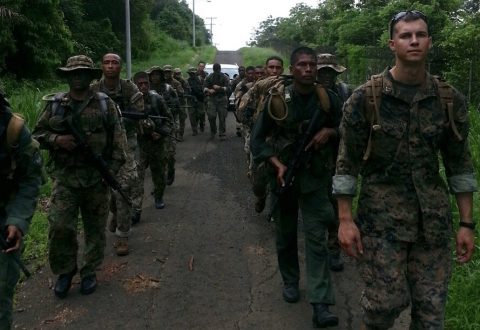Auchincloss leading a combined special operations mission in Panama (2014)
America can use mining partnership in Afghanistan to force human rights improvements
One year after ending the failed war in Afghanistan, the United States is in a stronger position. Without boots on the ground, we have more resources to counter Russia and China, while maintaining the capability to take terrorists off the battlefield. Afghanistan, though, is struggling. But there is a path forward that helps the Afghan people while further strengthening America.
Western mining can do what Western militaries never could: put Afghanistan on the path of self-sufficiency. Afghanistan has vast mineral wealth. Mining could bootstrap economic development for the Afghan people. It could also secure for the United States the raw materials necessary to boost semiconductor and clean energy production, as intended by the blockbuster Chips and Science Act and Inflation Reduction Act.
We can’t delay. Days after the United States left, the Chinese Communist Party started ramping up its decade-long designs on Afghanistan’s $1 trillion of mineral deposits. The Chinese see 20 years and $2 trillion of American blood, sweat, and treasure as the groundwork for their own extractive industries. Their designs include a tenuous contract with the Afghans to mine copper at Mes Aynak, near Kabul.
The Chinese offered a power plant and a railroad as part of the contract. They work well with the Taliban’s allies in Pakistan. And, they do not hold the Taliban to account for its human-rights abuses and drug trade.
There is an opening for the United States, though. The Chinese are not delivering economic development. They reneged on building the railroad. They also balk at establishing copper processing on site. Instead, they want to transport the raw ore out of the country, preventing Afghan industry from climbing the next rung of the value chain. The Taliban’s Minister of Mines and Petroleum is reported to prefer American to Chinese miners; this year, he had a virtual meeting with a few American companies, inviting them to invest in Afghanistan.
The United States and its Western allies should take him up on the offer, with strict conditions. The agreement could start with copper mining at Mes Aynak, a direct rebuttal to the Chinese. Cooperation might then expand to sites with lithium, iron, rare earth elements, gold, lapis lazulis, and other in-demand minerals or gems. Also, possible: oil and gas production in northern Afghanistan, where the China National Petroleum Corporation seeks to restart operations in the Amu Darya Basin, but where U.S. companies are also well-positioned.
In exchange for Western investment in the mineral extraction and processing, power generation, transportation, and workforce development necessary to build an Afghan mining industry from scratch, U.S. diplomats must require the Taliban to partner with one or several multilateral development banks (MLB), such as the Asian Development Bank or the U.S. Development Finance Corporation. The MLB would draft and enforce the contracts, especially royalty rates. It would also work to ensure that mining revenues support social and economic development, not narco-terror cabals. Funding should be a public-private partnership; unfrozen Afghan central bank funds and global aid could be first dollars in, starting with a feasibility study, to de-risk companies’ long-term investments.
The challenges in this project are immense. The Taliban might lie, cheat, and steal. China and Pakistan might obstruct. Mining companies might drag their feet. But, we must do something to change the status quo. The Afghan economy runs on opium and meth. The only near-term alternative to drugs is minerals. So, let’s try it. As a first step, I have a bill in Congress to direct the State Department to study a Special Economic Zone in Afghanistan for mining.
This project is also not an excuse for inaction on immediate crises. The United States, already the world’s largest humanitarian donor to Afghanistan, must do more to improve food security, especially for children. To honor our commitment to allies, the administration should expand Operation Allies Welcome and Congress must pass the Afghan Adjustment Act. And, we must use every point of leverage to change the Taliban’s most egregious behavior, particularly regarding the rights of women and girls and the release of Mark Frerichs.
The American people owe this support to the Afghan people as we work to stabilize the region. Our greatest gift, though, will not be assistance, but economic empowerment. Mining is the first step.
Jake Auchincloss represents the Massachusetts Fourth Congressional District in Congress where he is Vice Chairman of the House Financial Services Committee. Congressman Auchincloss commanded infantry in Afghanistan and special operations in Panama. In Afghanistan in 2012, he led patrols through villages contested by the Taliban. In Panama as part of the Marines’ elite reconnaissance branch, his team trained local units to stop the drug trade. He’s now a major in the reserves.








Comments